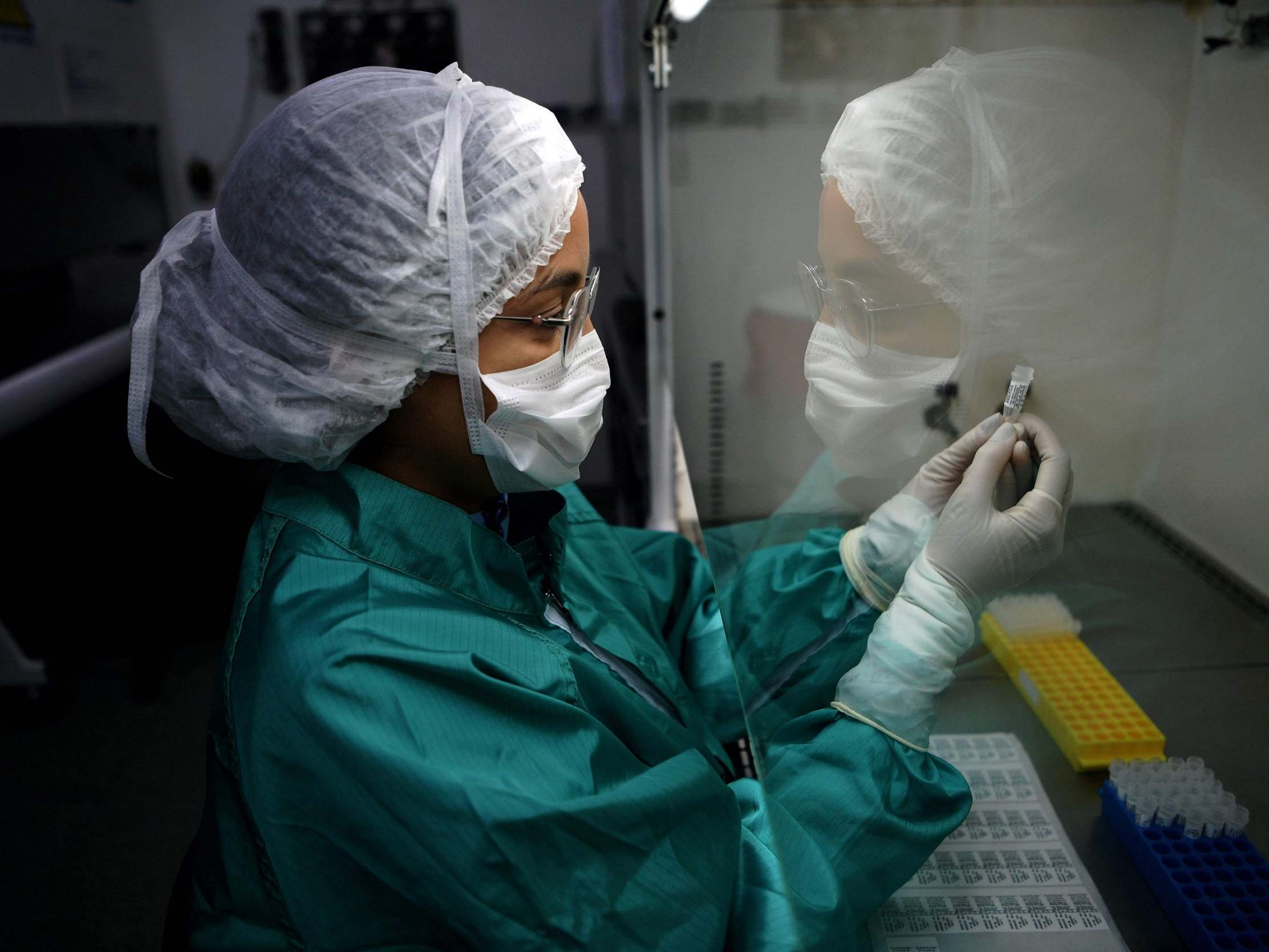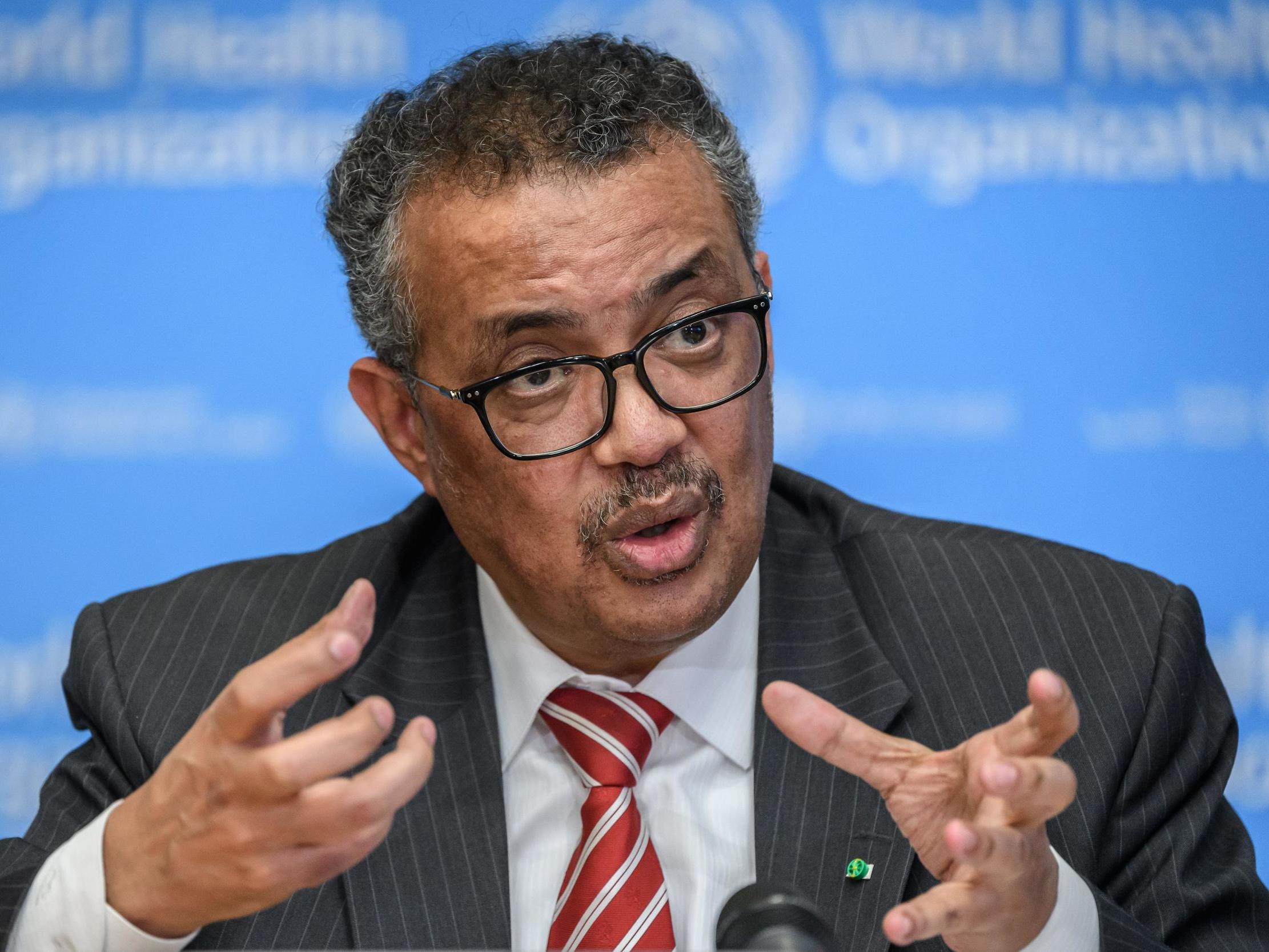Coronavirus: Trump to announce new curbs on WHO funding over handling of Covid-19 crisis
‘The WHO is China-centric. China always seems to get the better of the argument and I don’t think it’s fair to the American people,’ says president
Your support helps us to tell the story
From reproductive rights to climate change to Big Tech, The Independent is on the ground when the story is developing. Whether it's investigating the financials of Elon Musk's pro-Trump PAC or producing our latest documentary, 'The A Word', which shines a light on the American women fighting for reproductive rights, we know how important it is to parse out the facts from the messaging.
At such a critical moment in US history, we need reporters on the ground. Your donation allows us to keep sending journalists to speak to both sides of the story.
The Independent is trusted by Americans across the entire political spectrum. And unlike many other quality news outlets, we choose not to lock Americans out of our reporting and analysis with paywalls. We believe quality journalism should be available to everyone, paid for by those who can afford it.
Your support makes all the difference.President Donald Trump is likely to announce restrictions on US funding for the World Health Organisation this week over its handling of the coronavirus pandemic, as the administration and conservative allies ramped up their criticism that the United Nations agency catered to China early in the outbreak and jeopardised global health.
Mr Trump hinted at a temporary hold on US funding Friday but said he wanted to wait until after Easter to announce anything. He said his administration would discuss the organisation “in great detail” this week, saying he did not want to go further “before we had all the facts”.
Secretary of state Mike Pompeo and other US officials are expected to recommend to Mr Trump how to dock or condition payments to the agency as Republicans in Congress seek documentation of WHO dealings with China, said people familiar with White House and State Department discussions who requested anonymity to discuss the private conversations.
“They are very, very China-centric,” Mr Trump said Friday. “China always seems to get the better of the argument and I don’t like that, I really don’t like that. I don’t think that’s appropriate. I don’t think it’s fair to the American people.”
Speaking at the daily White House coronavirus news conference, Mr Trump focused on the level of US funding and the disparity with China’s contribution. The administration review is expected to be broader, to consider how well the agency responded in December, January and February as the virus began spreading rapidly inside China and then beyond its borders, said the people familiar with the talks.
At issue are ongoing voluntary US payments to the United Nations health body, based in Geneva. The United States is the largest single donor to the WHO, with “assessed” or mandatory funding and larger voluntary contributions that often go to fund specific projects or crisis response.
The United States has provided the agency with $893m (£715m) during its current two-year funding period, the health news website statnews.com calculated last week. Funding varies year by year. Chinese contributions are a fraction of that.
Republicans in Congress are seeking documents from the WHO and calling for investigations of contacts between WHO officials and Chinese government officials. The White House backs those efforts but could hold up funding before results are in.
“The money is not guaranteed if WHO does not do its mission,” a senior administration official said.
The official, who requested anonymity because the administration has not yet decided how to proceed, said the quarrel is less with the organisation’s health professionals and more with its political leadership.
“The problem is not the WHO system. The system has good people,” the official said. “It’s about comments made from the leadership – which went beyond what I am told their own staff wanted to say.”
The president has piled on to rising conservative criticism of the WHO, which is paired with criticism of China as deceptive and defensive during the crucial early weeks of the crisis.
But while the WHO has been criticised for not taking a more sceptical approach towards China, critics of the organisation note it has also taken a soft approach towards US efforts to mitigate the pandemic despite widespread criticism of how the Mr Trump administration has responded. The question, they argue, is whether the WHO is taking a conciliatory approach towards major financial patrons, including the United States and China, as opposed to solely favouring the communist regime in Beijing.
For Mr Trump, the focus on the United Nations entity shifts some blame from his own early reaction, when he dismissed the virus as no threat to the United States. The president has said he “inherited” a health system that wasn’t up to the task and blamed Democrats and the news media for hyping the threat. But he has never offered a full accounting of what his own administration was doing to protect the country in late 2019 and the first weeks of January, the period before and during the entrance and initial spread of the virus in the United States.
Accurate assessments of the risk at the outset could have given the US government a jump on the need for social distancing and other preventive measures and lead time to procure additional tests, masks, respirators and other equipment now in short supply, said two people who have spoken with Mr Trump about the WHO.
“We’re going to have an announcement on the World Health Organisation sometime next week,” Mr Trump said Friday. “As you know, we give them approximately $500m a year. And we’re going to be talking about that subject next week. We’ll have a lot to say about it. We’ll hold it.”
He had started attacking the agency by name several days before, on Tuesday, when he tweeted that “The WHO really blew it,” and noted the heavy share of US funding the agency receives.
Speaking to reporters hours later on Tuesday, Mr Trump went further.

“We’re going to put a hold on money spent to the WHO. We’re going to put a very powerful hold on it and we’re going to see,” Mr Trump said Tuesday. “They called it wrong. They call it wrong. They really, they missed the call.”
He backed off that threat during the same press briefing, saying the decision had not been made but has continued to criticise the agency.
Accusing the WHO of being slow to react allows Mr Trump an I-told-you-so moment. The organisation pointedly dissented from Mr Trump’s decision in late January to impose severe travel restrictions on travellers from China. Mr Trump has claimed ever since that the decision saved American lives and complained that he was not given credit for foresight.
“They criticised me very strongly when I said that we’re going to shut down flights coming in from China, and especially from certain parts of China, but from China generally,” Mr Trump said Wednesday. “We were criticised very badly.”
Pointing a finger at the WHO also fits with Mr Trump’s long-standing scepticism about the United Nations and complaints that the United States spends too much and gets too little from international organisations.
On Friday, he likened the WHO to the World Trade Organisation, a much more frequent target of Mr Trump’s ire, saying both bodies have routinely taken advantage of the United States.
For many conservatives aligned with Mr Trump, the issue is equally about scepticism that the WHO is bloated, ineffective or biased, and about alleged Chinese perfidy.
Former UN ambassador Nikki Haley appeared twice on Fox News last week to accuse the agency of covering for China. She backed a call for a full investigation from Senator James Risch, R-Idaho, chairman of the Senate Foreign Relations Committee.
Mr Risch is expected to speak by phone early this week with WHO director-general Tedros Adhanom Ghebreyesus, before the Senate effort moves ahead, a Republican Senate aide said.
As other conservatives have done, Ms Haley pointed to Taiwan, which China considers a rogue province, to make the point that China was duplicitous.
“I mean look at the timeline. You’ve got, 30 December, Taiwan goes and tells the WHO ‘we believe and have evidence that there’s human-to-human transmission’. Then you have, 14 January, the head of the WHO, Tedros, says ‘we don’t see any evidence of human-to-human transmission’,” Haley said on Friday on Fox and Friends.

At a press briefing last week, Dr Tedros predicted that the United States “will continue to contribute its share”.
“I would like to take this opportunity to thank the US for its generous support so far,” he said.
On Thursday, several Republican members of the House Oversight Committee requested documents and other information from the WHO about its relationship with China and its response to the pandemic.
“Throughout the crisis, the WHO has shied away from placing any blame on the Chinese government, which is in essence the Communist Party of China,” the lawmakers wrote to the WHO chief.
Representative James Comer, R-Ky., was among those signing the letter. In an interview Friday, he said he “100 per cent” supports a holdup of US funding for the WHO, which amounts to roughly 15 per cent of the agency’s budget. “You would stop the check,” while questions are answered, he said.
Mr Comer said he and his colleagues want to know “did they drop the ball and make honest mistakes or were they going along with Chinese propaganda and taking China’s word for it on what the problem was”.
Mr Comer said the agency’s early pronouncements on the outbreak were “completely inaccurate”.
Several Republican Senate aides interviewed about the WHO’s response criticised it as halting and incomplete but said it is not yet clear whether the agency was complicit in any Chinese whitewash of the outbreak.
In the early going, the agency was balancing its need for access to on-the-ground information from China, which would affect the effectiveness of the agency’s response, with its duty to speak truthfully about the threat, one Republican Senate aide said.
The WHO’s complicity in any cover-up will rest on whether the agency went beyond a need to publicly extend the benefit of the doubt and actively fronted for the Chinese government, the aide said.
Mr Trump’s escalating confrontation with the WHO over its connection to China comes as he is attempting to complete a massive trade agreement with Beijing. He expressed optimism about the pact Friday while noting that he has not dropped 25 per cent tariffs on some Chinese goods.
Comer said the pandemic is not likely to affect the outcome of negotiations, but he predicted that the Chinese response to the coronavirus pandemic gives the president leverage.
“If we can prove they’ve misled us on something that’s by all accounts led to a loss of American lives and certainly disrupted the American economy, I think the president’s got more credibility and a greater potential for success,” Comer said.
The Washington Post

Join our commenting forum
Join thought-provoking conversations, follow other Independent readers and see their replies
Comments